6 Types of Superfood Nutrition for Optimal Wellness
In a hurry? Click here to read the Article Summary...
Everyone knows that the human body requires proper nutrition in order to live. And it’s safe to say that most everyone knows that eating healthy is necessary in order to live well. So why then do so many people (perhaps you’re one of them) seem to come up short in achieving the types of life-changing results they want… even when following the eating advice given to them by their doctors and dietitians?
For one, the definition of what it means to “eat healthy” varies widely depending on who you ask. For some people, eating fast food just three times a week instead of five (or more!) means that they’re doing a pretty good job at staying healthy. For others, eating healthy means popping a multivitamin after a sugar-filled breakfast of cereal and muffins and calling it a day.
Avoiding fast food and taking multivitamins aren’t bad things, of course. But with the challenges we face in the modern world, these actions simply aren’t enough to really achieve an optimal level of wellness that leaves the body feeling good and full of energy.
Supercharging your health requires a whole lot more than just eating a salad every now and again or switching to bottled juice instead of soda pop. It requires dialing in on practical ways to mega-boost your diet with superfood nutrition from as many different sources as possible.
It might sound complicated right out of the gate, but learning these hidden tricks of the dietary trade doesn’t have to be overwhelming, and it certainly isn’t unattainable.
When it comes to superfood nutrition, there are six major categories that serve as a great starting point if you’re really serious about fast-tracking your way to real health.
Focusing on including more of these foods into your daily routine is a surefire way to get a head start on forging a solid pathway to what we all hope to achieve − optimal wellness.
Superfood #1: Medicinal Mushrooms
Whether sautéed or stir-fried, mushrooms are a tasty addition to almost any savory dish. But did you know that there are more than 10,000 different varieties of mushrooms just in North America alone?
Among these, many mushrooms fall into the therapeutic category of medicinal fungi, as they offer a diverse array of health benefits… some of which may surprise you.
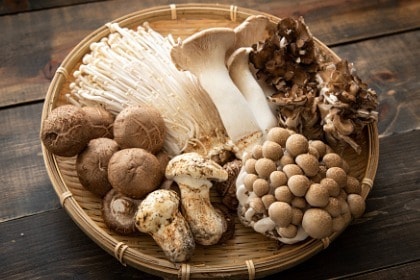 Turkey tail (Trametes versicolor) mushrooms, for instance, possess powerful antioxidant potential, helping to enhance the immune system and lower cholesterol levels.
Turkey tail (Trametes versicolor) mushrooms, for instance, possess powerful antioxidant potential, helping to enhance the immune system and lower cholesterol levels.
Reishi (Ganoderma lucidum) mushrooms are similarly immune-supportive, also helping to ward off viruses while calming the mind. In the event that you encounter a poisonous mushroom, reishi mushrooms can further serve as a potent antidote, while also helping to balance the adrenal glands and promoting feelings of calm.
You may have heard of Shiitake (Lentinula edodes) mushrooms because they’re popular cooking mushrooms, but they also have a number of studied health benefits. Shiitake mushrooms are so “medicinal,” in fact, that herbalist Christopher Hobbs, editorial advisor for Herbs for Health, says they’re effective for nearly every ailment.
Superfood #2: Exotic Superfruits
We’re all familiar with common fruits like apples, oranges, and strawberries. But what about not-so-common varieties like acerola cherry and camu camu?
Both of these exotic superfruits contain some of the world’s highest levels of natural vitamin C, it turns out, and both can do wonders for the body in terms of strengthening its defenses and improving its overall functionality.
Studies show that acerola cherry is a powerful antioxidant fruit rich in flavonoids like quercetin that support cardiovascular, immune, and respiratory health. It’s also a potent DNA protector that minimizes oxidative damage and ultimately helps to prevent the types of harmful mutations that lead to cancer growth and proliferation.
Camu camu is a type of Amazon rainforest fruit that’s also rich in antioxidants (especially vitamin C) that helps to combat early aging while simultaneously helping to support healthy inflammation levels in the body. This, combined with beneficial phytonutrients such as ellagic acid, quercetin, and myricetin, makes camu camu exactly the type of superfood you need to achieve your health goals.
Superfood #3: Sprouted Seeds
These tiny packages of nourishment are where life begins, which explains why foods such as chia seeds are an incredibly important part of any healthy diet.
But even for all of their many health benefits, seeds become even healthier when they’re sprouted. Sprouting unlocks a cornucopia of seed nutrition that would otherwise not be accessible by the body. Seed germination not only makes seeds more nutritionally bioavailable, but it also boosts their overall nutrient content − in many cases by dramatic amounts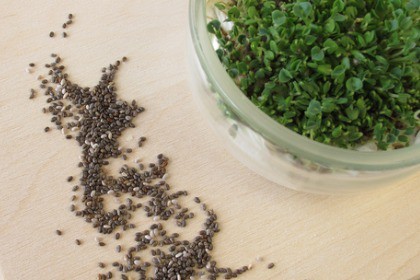
Sprouting is especially important because it deactivates certain “anti-nutrients” in seeds that can inhibit nutrient absorption and even rob your body of its own nutrient stores.
Such anti-nutrients include things like phytic acid, enzyme inhibitors, lectins, saponins, and polyphenols. If you’ve ever felt like your body doesn’t agree with seeds (or nuts or beans), it could be because of these anti-nutrients, which are effectively removed during the sprouting process.
Superfood #4: Fermented Herbs
Herbs are already an underrated dietary element, and fermented herbs especially so. Like sprouting, fermenting helps to break down and convert one type of nutrient into another, making it more digestible and assimilable than it otherwise would be in its unfermented form.
Pretty well all herbs offer significant health benefits, so make sure you’re using plenty of fresh, dried, and/or fermented herbs such as garlic, ginger root, and turmeric in your cooking.
Superfood #5: Probiotics
Without these active little critters in our bellies, we would have a very difficult time digesting our food. Probiotics are what perform the digestive equivalent of both sprouting and fermenting inside the gut. They help to balance the microbial ecosystem that keeps a close eye on foreign invaders and makes sure that everything we eat is digested in such a way that the body can use it for growth and repair.
There are untold numbers of probiotic bacteria and bacterial colonies that live inside our digestive tracts, not to mention the many varieties that live in soil such as Bacillus subtilis.
In a perfect, chemical-free world, these soil-based probiotics would enrich the foods we eat while they grow. However, oftentimes these are missing, which is why probiotic supplementation can be beneficial.
Helping to activate other nutrients and make them more bioavailable, these pro-nutrients actively support nutrient metabolism while helping to balance gut function.
Superfood #6: Enzymes
Last, but certainly not least, are enzymes. These protein catalysts function as the energy force for the entire body. Not only are enzymes essential for the breakdown of food to be used for energy and cellular metabolism, but they also serve as the engineers, technicians, and maintenance crews to keep the many vital systems of the body functioning at full speed and with optimal efficiency.
Enzymes are perhaps the most overlooked dietary element because many people don’t even know what they are. And yet, without them, life itself would not exist. Cooked, processed, and chemical-treated foods − which many people eat on a regular basis − are mostly or completely devoid of enzymes, which makes these foods harder for the body to digest.
The following are among the most important enzymes lost as a result of processing and heating that are worth supplementing with in order to correct this deficiency:
- Cellulase: Necessary to break down plant fiber in greens, sprouts, herbs, and fruits
- Beta-glucanase: Necessary to break down fungi, yeast, and cereal bran fiber
- Amylase: Necessary to break down carbohydrates and starches
- Xylanase: Necessary to break down “tougher” fiber in beans, cereal grains, and certain vegetables
- Protease: Necessary to break down protein
- Glucoamylase: Necessary to break down carbohydrates and starches
- Phytase: Necessary to convert “anti-nutrients” in beans, seeds, legumes, and grains into nutrients and trace minerals
- Pectinase: Necessary to break down pectin fiber in fruits and vegetables
- Lipase: Necessary to break down fats
- Lactase: Necessary for processing milk lactose
- Alpha-galactosidase: Necessary to break down complex carbohydrate foods like cruciferous vegetables
- Hemicellulase: Necessary to break down plant fiber in greens, sprouts, herbs, and fruits
- Invertase: Necessary to break down complex sugars into simple sugars
All plant foods contain digestive enzymes, so be sure to incorporate plenty of servings of organic fruits and vegetables into your daily diet. You might also consider adding a full-spectrum enzyme supplement to your daily regimen to aid digestion and increase the metabolism of carbs, fat, and protein.
The latest formula of Organic OrganiGreens is our best yet. In just one simple scoop, add 17 sprouted and fermented superfoods and botanicals, plus probiotics and enzymes, to your daily diet to fill nutritional gaps and support healthy immune function, increased energy and mental clarity, as well as digestion and detoxification processes. Easily mixes in water, smoothies, juices, and recipes, and it also tastes great – even without any added sugars.
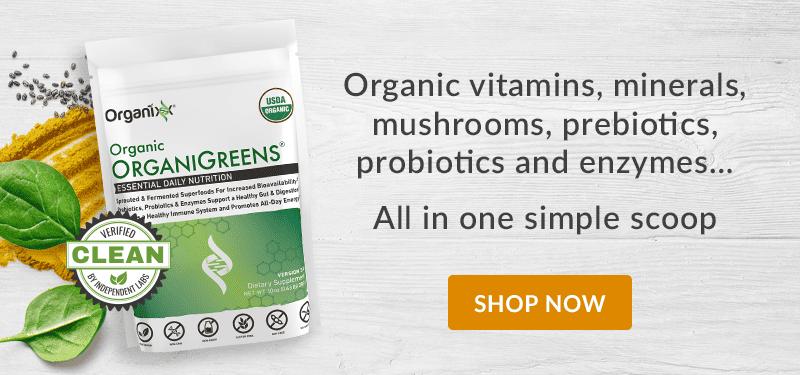
 Sources:
Sources:
Article Summary
When it comes to superfood nutrition, there are six major categories.
Medicinal mushrooms support immune health, among other benefits.
Exotic superfruits contain some of the world’s highest levels of natural vitamin C.
Sprouted seeds are more nutritionally bioavailable and sprouting boosts their overall nutrient content.
Fermented herbs provide anti-inflammatory benefits and support for the thyroid gland, adrenal glands, immune system, brain, and blood.
Probiotics help to balance the microbial ecosystem.
Enzymes function as the energy force for the entire body.


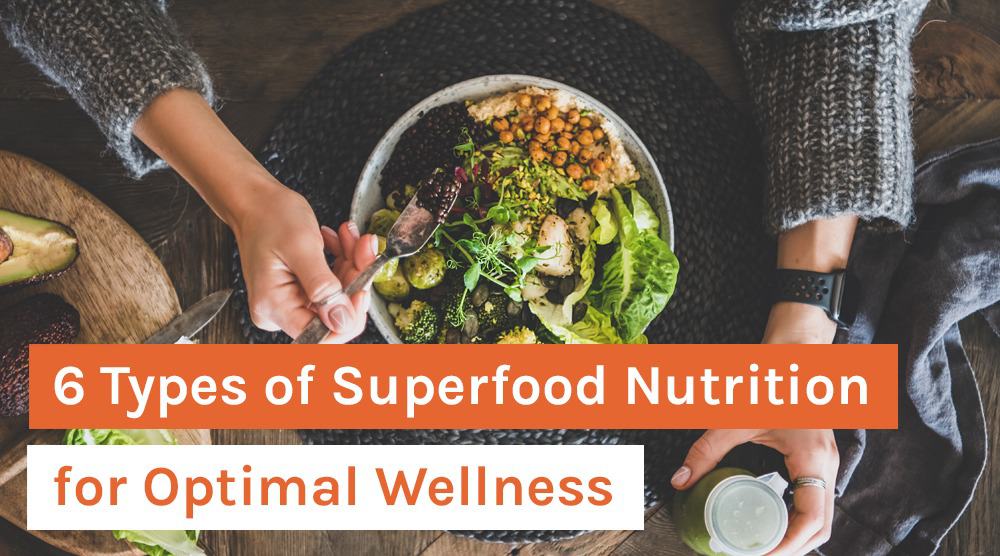
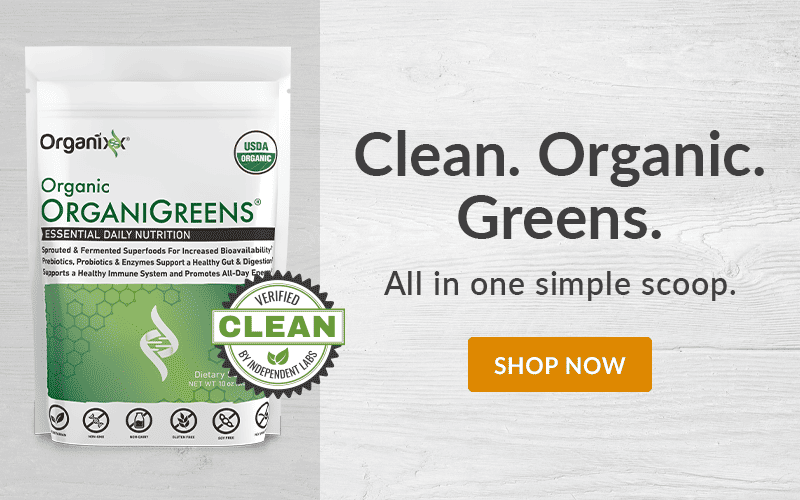

I need a green juice or powder for lost weight please
Hi Angela, As you may know we used to offer OrganiGreens. Unfortunately, we no longer offer them. However, we hope to bring them back sometime around the end of the year. Please stay connected so that you will know when we have them available. Thank you for being here with us. Have a great day! :)
The article is great and i believe it is opening several people's eyes to better and adjust the mode of nutrition they are previously engaged in, of course me inclusive.
I will follow the right path of juicing and apply the necessary méthods of nutrition like going RAW.
KEEP IT UP GUYS.
BUT how can I get enzymes in beans and other plant which contain antinutrients without BOILING them???
Hi Tot, thank you so much for your feedback and question.
We're so happy to hear that you got a lot of value from this article and are willing to give juicing a try as well as applying other nutritional methods to your diet.
As far as getting all the necessary enzymes from your fruits and veggies, we highly recommend our Organic OrganiGreens. It's more nutrient-dense than juicing. It contains 17 different essential enzymes, and powerful probiotics as well as 71 of the healthiest veggies, fruits, herbs, spices, mushrooms, and seeds!
Feel free to check out all the details here: https://organixx.com/organic-organigreens/ and let us know what you think.
Hope this helps. Hope you have a wonderful weekend!
Thank you for a great, informative article in simply spelling out the 6 superfoods very good for our health, so easy to list at the top of my grocery list and enjoy learning to become familiar with!
I appreciate you reaching out and the hard work to help educate the masses in our countries who have been fed too many lies through scores of years. It's an urgent and noble calling; and much needed! As people start to realize good and some even dramatic changes in their physical bodies there will be more understanding and trust. Keep up the good work!
We are happy to know that this post helped you a lot, Arlene! Thank you very much for the continued support.
I purchased your organigreens and multivitamax. I like the organigreens. However, when i asked what was in it, there was no real response except you could not give the information. Not good. I only wanted to know if there was any vitamin k2, since that is much better than K., for assimilation of D3. Also, why is folic acid still on the label, if it is from a natural form of folate. No real info on what is actually in the vitamins. Naturelo is a great wholefood multi as well, and the company discloses all the details on what is in their products. NOT yours. i might not reorder unless this question is answered.
We understand how important this is for you, Kenneth. We recommend getting in touch with our Customer Support Team online at https://support.organixx.com or by calling 1 877-750-6455 to clarify this issue.
Very interesting
Thanks for letting us know, Derek! We appreciate your feedback.